A Love Story: One Husband’s Steadfast Commitment to Care For His Wife Amid Her 16-year Battle with Alzheimer’s
The story was co-published with World Journal as part of the 2024 Ethnic Media Collaborative, Healing California.
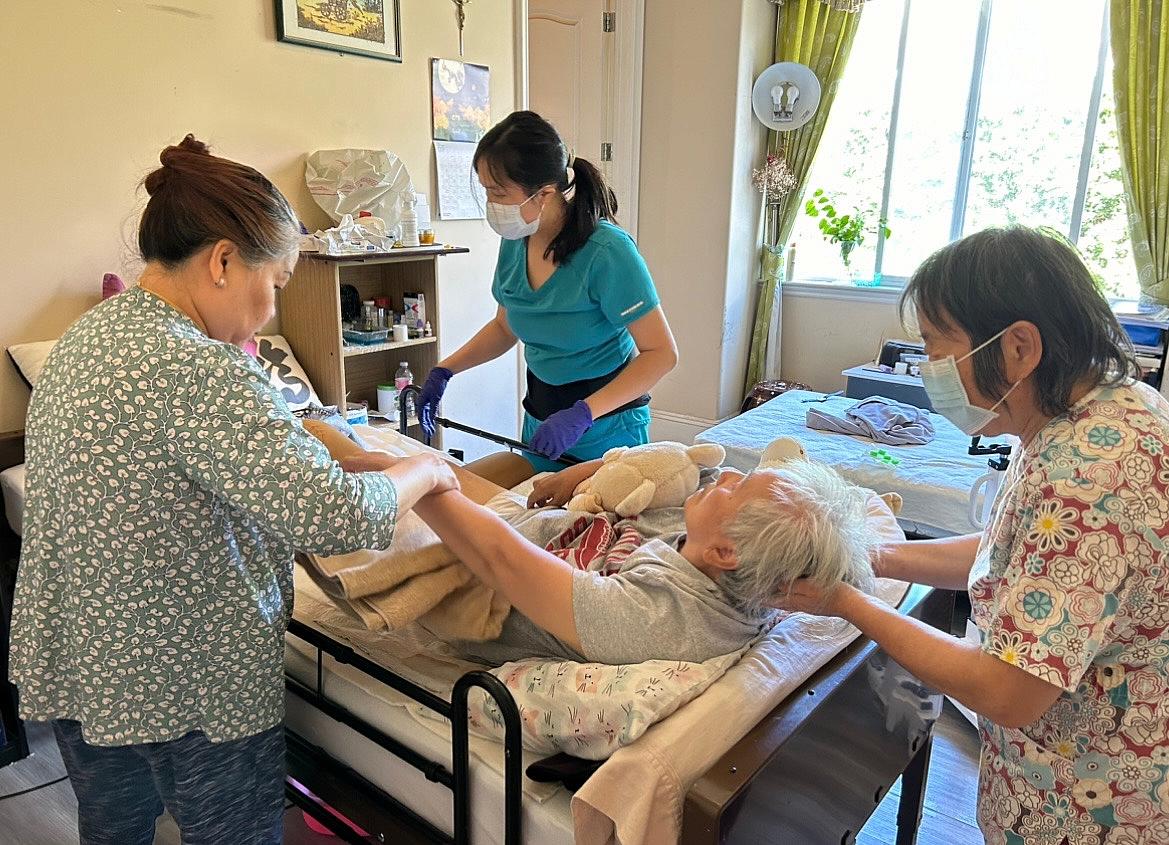
One in three family caregivers of people with Alzheimer's disease experience persistent symptoms of depression. Zongjin Wu, however, is an exception.
Caring for his wife, Alice Wu, for over 16 years hasn't led him into depression. Instead, it has deepened his sense of connection and companionship, despite the challenges.
Zongjin Wu is one of millions of unpaid family caregivers who is caring for a loved one at home.
My recent interview with Wu took place after 9 p.m., the only time he's available. As a 76-year-old retired man, he’s busy every day from 7 a.m. until 9 p.m. “I feel like I've never really retired,” he said from his home in Arcadia, a city in California with a large Chinese-population.
Busy Day
Alice, 75, is one of nearly 7 million people in the U.S. who have Alzheimer’s, and this is the reason Wu is busy all the time.
Alice, now in the final stages of her disease, requires constant care, and one person is simply not enough. Wu has hired three caregivers to assist him, with shifts covering the morning, afternoon, and evening, at great personal cost from their pension and life savings.
In the advanced stages of Alzheimer’s, when certain areas of the brain, particularly those responsible for motor control, coordination, and cognitive functions, are damaged. This can impair a person's ability to perform basic movements, such as swallowing and flipping over in bed. The loss of mobility increases their vulnerability to physical complications including blood clots, skin infections and sepsis, according to the Alzheimer’s Association’s latest report.
"Every 1.5 to 2 hours, she needs to be turned over, her back patted, and a massage given to help with blood circulation," Wu said. She also needs help to clear the saliva that accumulates in her mouth, since she can't swallow. If too much builds up and gets stuck in her throat, she could stop breathing.
"Not a moment can be relaxed," Wu said.
In addition to meeting Alice’s basic caregiving needs, Wu takes her to the yard every afternoon for some sun and fresh air. He feeds her cranberry juice several times a day through her tube to help reduce the risk of bladder infections, and arranges massage therapy for Alice twice a month to promote blood circulation.
Under Wu's attentive care, Alice, despite being unable to move or speak, remains in excellent physical health. She looks far younger than her 75 years — except for the silver hair on her head.
Connection
"My biggest fear now is I'll pass away before she does," Wu says. He wants to do his best to accompany Alice through the final stage of her life, until he can't care for her anymore.
These days, Wu has been making a conscious effort to work out every evening, between 9 p.m. and bedtime —his only free time. He rides a stationary bike, does pull-ups, or jogs.
Wu suffers from severe spinal scoliosis, a condition he thinks was possibly exacerbated by years of stooping and leaning sideways to assist Alice downstairs, when she was still able to walk. The nerve compression causes unbearable pain, and now he relies on a cane to move around.
A study on Asian dementia caregivers in the Bay area, California reveals that Asian Americans are more than twice more likely to become caregivers for family members than the general population and filial piety, love, or responsibility as a family were the main reasons given to endure the caregiving burden.
Thousands of families are impacted. Between 2000 and 2018, the Asian population saw the greatest increase in the number of Alzheimer's deaths, increasing 746%.
"My sons are worried it’s too hard for me, and suggested sending Alice to a nursing home, but I refused," Wu says. "Taking care of her myself gives me a sense of companionship, and companionship makes life meaningful."
Underlying his commitment is a deeper faith in the institution of marriage.
“Chinese people tend to be traditional, and I am as traditional as it gets. I believe that a husband and wife should share everything, including life and experiences,” Wu adds.
Last Thanksgiving, Wu noticed that Alice no longer recognized their sons. "Although she's had the disease for so long, she smiled every time our sons came to visit us. But last year, she no longer had that smile."
"But she still recognizes me," Wu believes. His confidence comes from the fact that every morning, when he comes to Alice’s room, she calms down from her previous uneasy, murmuring state. "As soon as she hears my voice, she settles down. The caregiver can testify to this."
“I know, the connection between us is still there. I cherish this feeling. I know she will only feel at peace when I am by her side," Wu shared.
Wu and Alice were college classmates and have been married for over 50 years. In 1983, they moved from Taiwan to America to start their lives over again. After years of hard work, they created a happy family and established successful careers. Alice was a financial advisor for MetLife, and in 2007, she was recognized by the company's Hall of Fame for her outstanding achievements. Wu owned his own publishing and marketing company, providing up-to-date business information to Chinese businesses.
***
In 2008, when Alice was 59 years old, she was diagnosed with Alzheimer's. Wu chose to sell his business and become a full-time caregiver.
"The doctor told me traveling could slow down brain degeneration. So, I started taking her on trips. On the other hand, it’s like a race against time, taking her on journeys while she was still well enough to enjoy them," Wu says.
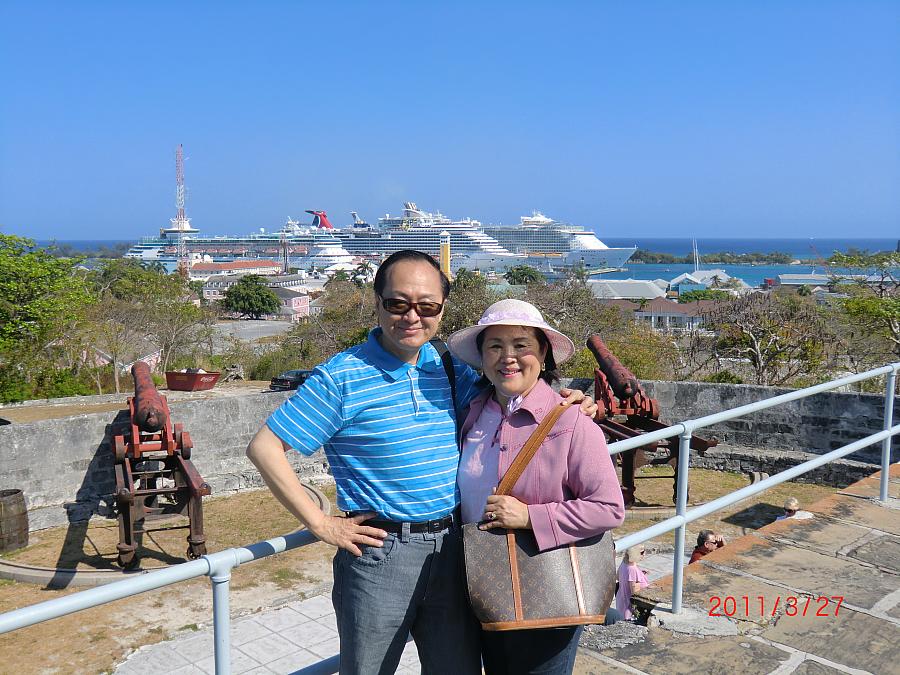
In the 3rd year of Alice's diagnosis, March 2011, on an Eastern Caribbean cruise, taken in the Bahamas.
Courtesy Zongjin Wu
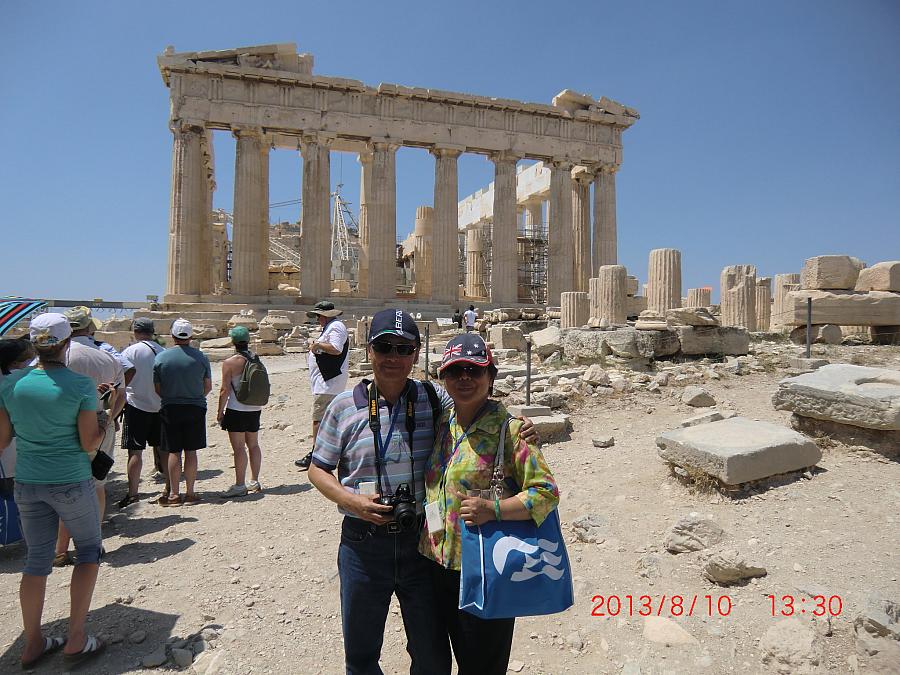
In the 5th year of Alice's diagnosis, August 2013, Aegean Sea cruise, taken in Athens.
Courtesy Zongjin Wu
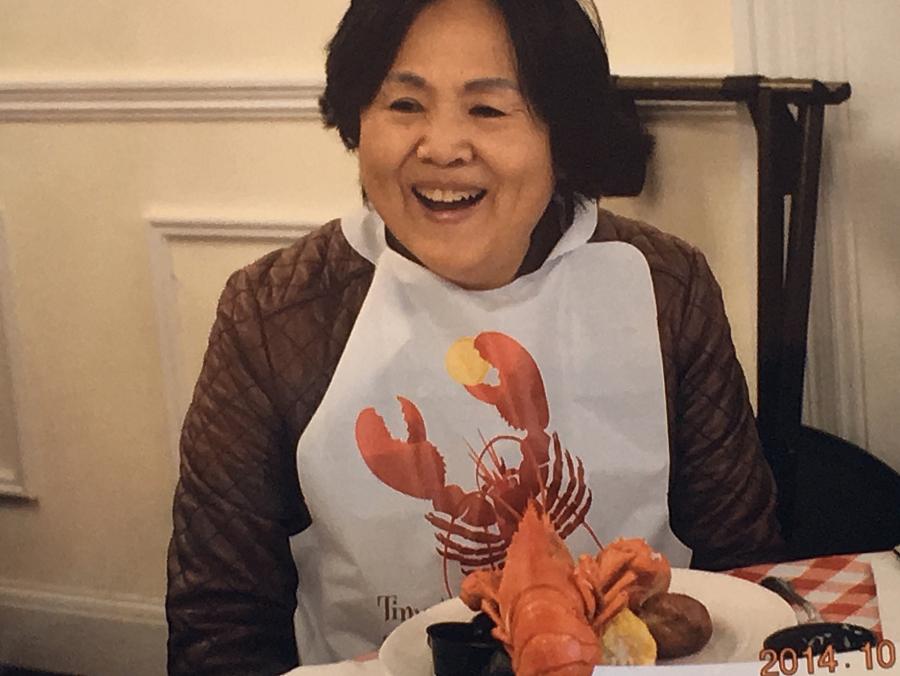
In the 6th year of Alice's diagnosis, October 2014, North America New England cruise, taken at a New England lobster restaurant.
Courtesy Zongjin Wu
At first, they traveled with friends who could help care for Alice, but it was not easy. Then Wu realized that cruising was the best option for her, allowing them to stay in the same room during the trip and making it easier to manage Alice’s incontinence.
They went on 18 different cruise trips over six years. In December 2018, which marked 10 years since Alice's diagnosis, they took their final cruise to Mexico.
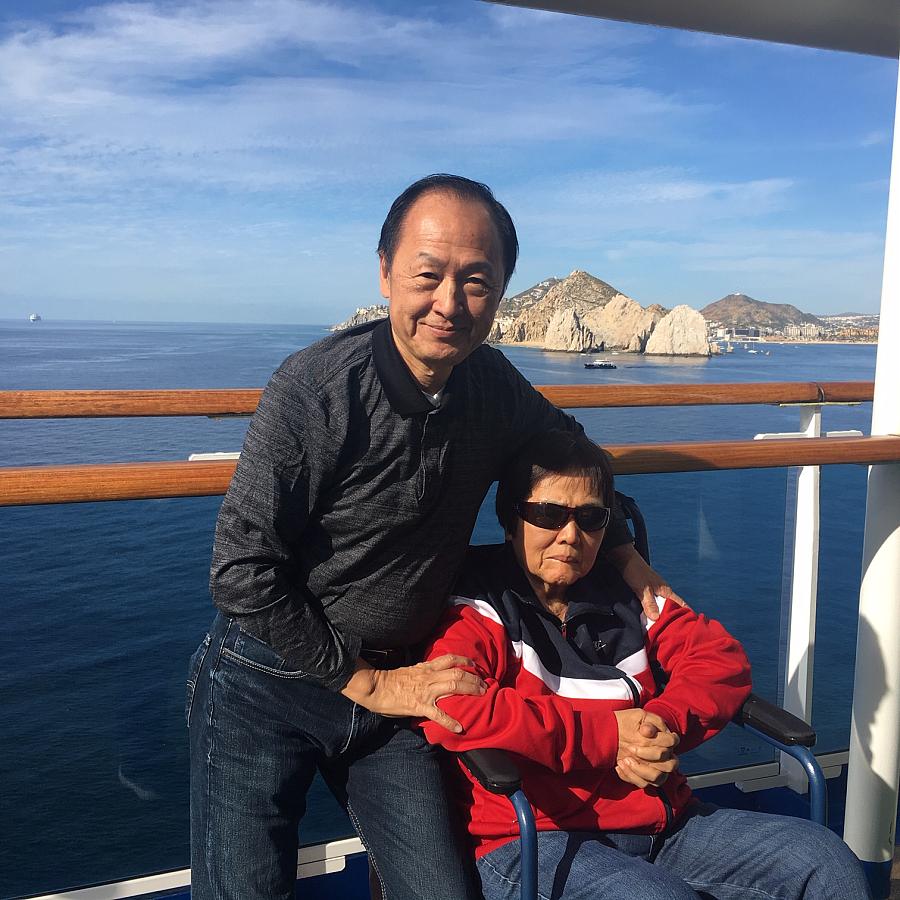
In the 10th year of Alice's diagnosis, December 2018, Mexico Riviera cruise, Alice now required a wheelchair.
Courtesy Zongjin Wu
As Alice's condition advanced to its later stages, travel was no longer possible. With her inability to speak, walk, or eat, caregiving grew increasingly demanding.
Caregiving for someone with Alzheimer's is described as ‘a lonely journey’ by Chinese Americans in a recent study. Participants reported high levels of caregiving stress associated with care-recipients' advanced symptoms, leading to physical and mental impairment like poor sleep, depression, and chronic conditions.
However, Wu feels his days are so packed that he doesn’t have time to think about his own emotions. When he has time, he writes and talks to his friends and he finds that this helps him.
Other Chinese mentioned using coping strategies like exercise, distraction, positive thinking, and having time alone, according to a study.
“Money is my only concern”, Wu said. In recent years, the annual $300,000 in living costs has become a heavy burden. Although the couple purchased long-term care insurance beforehand, the coverage is very limited, and Wu only receives $2,000 to $3,000 in reimbursements each month.
The study highlights the unique challenge faced by middle class caregivers. Middle-class families who neither qualify for Medicaid-funded home care nor have the means to pay for significant paid caregiving out-of-pocket must either rely solely upon family caregivers to meet their needs or pay out-of-pocket for paid caregivers until their wealth is exhausted and they become Medicaid eligible.
"Financial pressure is weighing heavily on me," Wu said., caregiving eExpenses include $15,000 a month for care workers, plus the cost of nutritional supplements, massage therapy and other care-related expenses. Their savings and pension funds are rapidly depleting.
But the harsh reality is that how long an Alzheimer's patient can live is largely dependent on the quality of care they receive.
"I'll have to sell off assets," he adds, “and ask my sons for support.”

“Asian families take on the responsibility of caregiving without thinking twice – an unwritten and sometimes unspoken practice that family is number one,” says Richard Lui, whose life reflects this cultural value.
As an award-winning Chinese American news anchor, Lui decided to set aside his growing career after his father was diagnosed with Alzheimer’s. He adjusted his work schedule to become a part-time anchor and flies from New York City to San Francisco to meet his caregiving responsibilities.
Through his own experience, Lui learned and demonstrated the unexpected power of selflessness, but he also found that Asian families often face the disease in isolation. “Interestingly, despite this core family strength, few talk about their caregiving activities or share best practices openly,” he shared with the Alzheimer's Association.
A study found Chinese cultural norms on 'family harmony' hindered their seeking of social support. Meanwhile, the complex healthcare system, insurance policies, and a lack of linguistically appropriate services also aggravated the psychosocial distress of Chinese American dementia caregivers.
“The challenges of Asian families are often underreported,” Lui emphasized in a symposium hosted by USC Annenberg Center for Health Journalism, urging more resources and attention for this group.
This project was supported by the USC Annenberg Center for Health Journalism, and is part of "Healing California", a yearlong reporting Ethnic Media Collaborative venture with print, online and broadcast outlets across California

